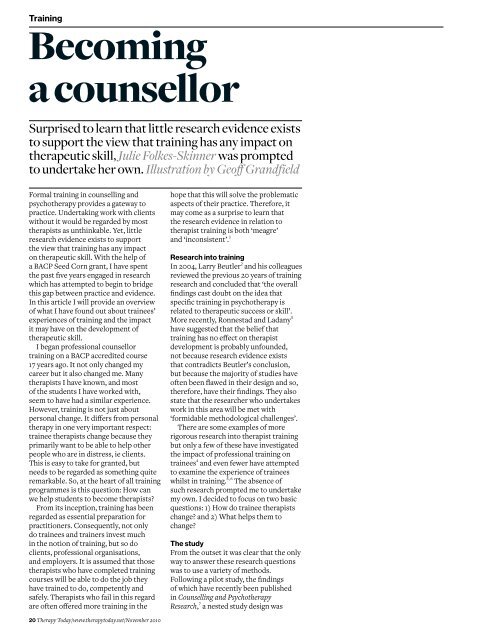Therapy Today
15301_november%202010
15301_november%202010
You also want an ePaper? Increase the reach of your titles
YUMPU automatically turns print PDFs into web optimized ePapers that Google loves.
Training<br />
Becoming<br />
a counsellor<br />
Surprised to learn that little research evidence exists<br />
to support the view that training has any impact on<br />
therapeutic skill, Julie Folkes-Skinner was prompted<br />
to undertake her own. Illustration by Geo Grandfield<br />
Formal training in counselling and<br />
psychotherapy provides a gateway to<br />
practice. Undertaking work with clients<br />
without it would be regarded by most<br />
therapists as unthinkable. Yet, little<br />
research evidence exists to support<br />
the view that training has any impact<br />
on therapeutic skill. With the help of<br />
a BACP Seed Corn grant, I have spent<br />
the past five years engaged in research<br />
which has attempted to begin to bridge<br />
this gap between practice and evidence.<br />
In this article I will provide an overview<br />
of what I have found out about trainees’<br />
experiences of training and the impact<br />
it may have on the development of<br />
therapeutic skill.<br />
I began professional counsellor<br />
training on a BACP accredited course<br />
17 years ago. It not only changed my<br />
career but it also changed me. Many<br />
therapists I have known, and most<br />
of the students I have worked with,<br />
seem to have had a similar experience.<br />
However, training is not just about<br />
personal change. It differs from personal<br />
therapy in one very important respect:<br />
trainee therapists change because they<br />
primarily want to be able to help other<br />
people who are in distress, ie clients.<br />
This is easy to take for granted, but<br />
needs to be regarded as something quite<br />
remarkable. So, at the heart of all training<br />
programmes is this question: How can<br />
we help students to become therapists?<br />
From its inception, training has been<br />
regarded as essential preparation for<br />
practitioners. Consequently, not only<br />
do trainees and trainers invest much<br />
in the notion of training, but so do<br />
clients, professional organisations,<br />
and employers. It is assumed that those<br />
therapists who have completed training<br />
courses will be able to do the job they<br />
have trained to do, competently and<br />
safely. Therapists who fail in this regard<br />
are often offered more training in the<br />
hope that this will solve the problematic<br />
aspects of their practice. Therefore, it<br />
may come as a surprise to learn that<br />
the research evidence in relation to<br />
therapist training is both ‘meagre’<br />
and ‘inconsistent’. 1<br />
Research into training<br />
In 2004, Larry Beutler 2 and his colleagues<br />
reviewed the previous 20 years of training<br />
research and concluded that ‘the overall<br />
findings cast doubt on the idea that<br />
specific training in psychotherapy is<br />
related to therapeutic success or skill’.<br />
More recently, Ronnestad and Ladany 3<br />
have suggested that the belief that<br />
training has no effect on therapist<br />
development is probably unfounded,<br />
not because research evidence exists<br />
that contradicts Beutler’s conclusion,<br />
but because the majority of studies have<br />
often been flawed in their design and so,<br />
therefore, have their findings. They also<br />
state that the researcher who undertakes<br />
work in this area will be met with<br />
‘formidable methodological challenges’.<br />
There are some examples of more<br />
rigorous research into therapist training<br />
but only a few of these have investigated<br />
the impact of professional training on<br />
trainees 4 and even fewer have attempted<br />
to examine the experience of trainees<br />
whilst in training. 5, 6 The absence of<br />
such research prompted me to undertake<br />
my own. I decided to focus on two basic<br />
questions: 1) How do trainee therapists<br />
change? and 2) What helps them to<br />
change?<br />
The study<br />
From the outset it was clear that the only<br />
way to answer these research questions<br />
was to use a variety of methods.<br />
Following a pilot study, the findings<br />
of which have recently been published<br />
in Counselling and Psychotherapy<br />
Research, 7 a nested study design was<br />
20 <strong>Therapy</strong> <strong>Today</strong>/www.therapytoday.net/November 2010


